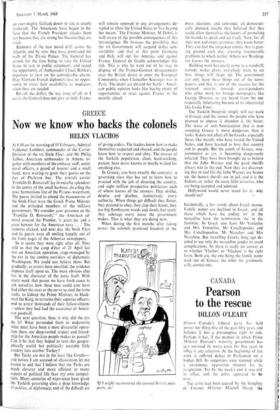Now we know who backs the colonels
GREECE HELEN VLACHOS
At 8.30 on the morning of 15 February, Admiral Valdemar Lambert, commander of the Carrier Division of the us Sixth Fleet, and Mr Philip.
Talbot, American ambassador in Athens, to- gether with members of the embassy staff, senior naval officers, a guard of honour and a small band, were waiting to greet their guests on the pier of Phaleron bay. The aircraft carrier 'Franklin D. Roosevelt' lay in metallic splendour in the centre of the small harbour, dwarfing the neat, harmonious line of the Piraeus waterfront. The guests invited to attend the manoeuvres of the Sixth Fleet were the Greek Prime Minister and the principal members of the military government. 'We consider your presence on the "Franklin D. Roosevelt," ' the American ad- miral assured the Premier, 'a great joy and a great honour for the American navy . . .' The cameras clicked, and next day the Sixth Fleet and its guests were all smiling happily out of the front pages of the Athenian newspapers.
So it seems they were right after all. They told us that the coup d'etat of 21 April last was an American operation, stage-managed by the cla in the sombre corridors of diplomatic Washington. We could not believe them. But gradually, as events have unrolled.. the evidence imposes itself upon us. The most obvious clue lies in the character of the junta itself. With every week that passes we have fresh cause to
ask ourselves how these men could ever have had either the nous or the nerve to steal the NATO
tanks, to kidnap the Prime Minister, to black- mail the King, to terrorise their superior officers, and to arrest thousands of their fellow-citizens —unless they had had the assurance of Ameri- can goodwill.
The next question, then, is why did the cm do it? What persuaded them to underwrite what must have been a most distasteful opera- tion (here our deep-rooted respect and friend- ship for the American people makes us pause)? Can it be that they hoped to turn this geogra- phically useful but politically unstable little country into another Turkey?
But Turks are not in the least like Greeks— and before I am accused of chauvinism let me hasten to add that I believe that the Turks are much cleverer and more efficient at many aspects of political life than my own compat- riots. Many centuries of experience have given the Turkish governing class a deep knowledge of politics, of diplomacy, and of the difficult art of giving orders. The leaders know how to make themselves respected and obeyed, and the people know how to respect and obey. The masses of the Turkish population, silent, hard-working, patient, have never known or maybe wished for anything else.
In Greece, you have exactly the contrary : a governing class that has yet to learn how to proceed with the job of directing the country, and eight million prospective politicians each of whom knows all the answers. They dislike, despise and disobey, instinctively, every authority. When things get difficult they flatter, they pretend to obey, they clap their hands, they use big flamboyant words and slowly but surely they sabotage every move the government makes. That is what they are doing now.
When during the first months after taking power the colonels promised freedom of the press, elections, and referenda, all_democrati- cally planned, maybe they believed that they could allow themselves the luxury of permitting the Greeks to speak and act freely. Now, for all their new and empty promises, they know better. They can feel the unspoken enmity that is gain- ing ground each day, creating innumerable problems to which neither Athens nor Washing- ton knows the answers.
Building work has nearly come to a standstill, nobody makes plans. everybody waits to see how things will shape up. The government can only keep these things out of the news- papers, and that is one of the reasons for the renewed severity towards correspondents who either work for foreign newspapers, like George Drossos, or are heard from the BBC (especially infuriating because of its objectivity) like Leslie Finer.
The Turkish blueprint simply will not work in Greece, and the sooner the people who have planned to impose it abandon it, the better. The wave of anti-Americanism that is now sweeping Greece is more dangerous than it looks. It does not affect all the Greeks, especially those, like myself, who have visited the United States, and have learned to love that country and its people. But the youth of Greece, non- communist as yet, is becoming dangerously infected. They have been brought up to believe that the John Waynes and the good sheriffs always win in the end. Now they are discover- ing that in real life the John Waynes are beaten up, the honest sheriffs are in jail, and it is the Indians, or rather the nasty little terrorists, who are being accepted and admired.
Hollywood would never stand for it: why should we? • Incidentally, a few words about Greek names. Family names are declined in Greek, and all those which have the ending 'Os' in the masculine have the termination 'au' in the feminine. In Greek you have Mr Venizelos and Mrs Venizelou, Mr Canellopoulos and Mrs Canellopoulou, Mr Niarchos and Mrs Niarchou. But travelling Greeks long ago de- cided to use only the masculine gender to avoid complications. So there is really no answer as to whether `Vlachos' or `Vlachou' is the right form. Both are, the one being the family name used out of Greece, the other the grammati- cally correct one.


































 Previous page
Previous page